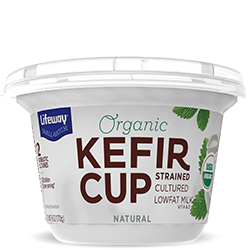Get the kettle boiling, open the window for some fresh air, and embrace the meditative process of creating your breakfast. Our spiced fig toast is the perfect recipe to awaken your taste buds before the day begins. We mixed organic fig jam with potent powdered ginger, layered it over our plain kefir, and topped it with honeyed walnuts. Each bite has the harmony of spice, sweetness, and crunch.
History
In the sandy ruins of a prehistoric village in Jericho, a Palestinian Territory, botanists found the remains of figs. The fleshy fruits provided evidence of being one of the earliest cultivated fruit crops. With proof of the fig being prominent in the prehistoric era, it is believed that many cultures took note and throughout the decades the fig became a religious symbol as the embodiment of peace, prosperity, and fertility.
Cleopatra, who ruled ancient Egypt for almost three decades, was known for her love of figs. Her death is even speculated to include the enticing fruit. It is believed that the beloved Queen either used a basket of flowers or figs to hide a poisonous snake for her suicide in 30 BC.
Figs were also influential in Ancient Greece. Greek athletes ate them during training for the Olympic Games. They were also an everyday food for the poor and the wealthy. In fact, the fruit was so heavily used that the Greek government banned any export of it.
Health
Figs are not only juicy with historical stories, but they’re also packed with health benefits. So, live it up like Cleopatra or the Greeks and enjoy these delectable beauties. Eating them daily can increase your intake of minerals, calcium, and potassium. Figs continue to get a standing ovation for their source of fiber (insoluble & soluble), potassium, manganese, and vitamin B6. Even more, they have soluble fiber such as pectin, which is a prebiotic! Prebiotics help promote the growth of probiotics such as those found in our kefir.
Cultured Dairy: The Nutrition Benefits You Actually Need to Know
With increasing research linking the correlation between probiotics, gut health, and immunity, it’s no secret that the integrity of our gut is vital to our health. Although additional factors such as stress, antibiotic usage, and individual health conditions can contribute to the condition of our gut, a focus on healthy food choices is one of the easiest ways to support the microbiome.
Several studies have shown a strong association between the gut-brain-microbiota. Probiotics introduced to the gut have been found to support immunity, improve allergies, and improve digestion.
One cup of low-fat plain Lifeway Kefir has 110 calories and 11 grams of protein, making it a great option for any lifestyle. It’s easy and convenient enough to consume on its own, but versatile enough for cooking and baking. Lifeway’s kefir is gluten-free and contains 12 live and active probiotic cultures (more than DOUBLE of traditional yogurt and milk), which may help increase the diversity of your gut microbiota.
Studies have shown that reduced diversity of healthy gut bacteria during early years is associated with an increase in food allergies during school age years. In addition, kefir made from whole fat milk helps absorb key nutrients such as Vitamins A, D, E, and K. Vitamin K is important because it helps your bones absorb calcium. It’s important to know that kefir contains a special trio: vitamin D, K, and calcium – all three crucial elements to support bone health.
Servings: 1 - 2Ingredients
- 3 tbsp fig jam
- 1/4 tsp of ground ginger
- 1 Natural Organic Kefir Cup
- 1/2 cup walnuts
- 1 tsp butter
- 1 tbsp honey
- 2 slices of toasted bread
Directions
- On a baking sheet toss 1 tsp of melted butter mixed with 1 tbsp of honey over the tray of walnuts. Bake at 350 degrees till the wet mixture starts to harden and become golden.
- Mix fig jam with 1/4 tsp of ground ginger
- Spread plain kefir cup over toasted bread and layer on the spiced fig jam. Top with honey glazed walnuts

